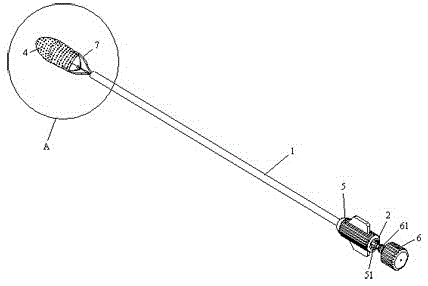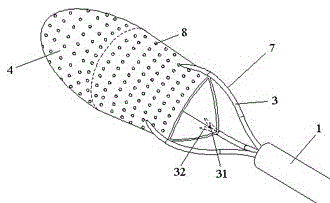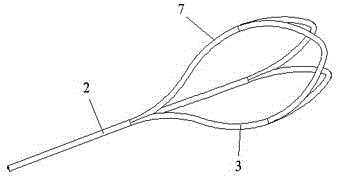Intracavitary extraction device for urinary system stones
A technique for urinary system stones and stone pockets, which is applied in the field of medical devices, can solve problems such as low efficiency, surgical complications, and the inability of the stone basket to pass through the operation channel, so as to achieve the effects of less damage and less obstruction.
- Summary
- Abstract
- Description
- Claims
- Application Information
AI Technical Summary
Problems solved by technology
Method used
Image
Examples
Embodiment 1
[0039] Please refer to figure 1 , figure 1 It is a structural schematic diagram of the device for extracting stones in the urinary system cavity of the present invention. The urinary system calculi intracavity extraction device is provided with a catheter 1 , a guide wire 2 , a basket 7 and a stone pocket 4 . The catheter 1 is a cylindrical hollow tube, a catheter handle 5 is provided on the outer periphery of the proximal end, and a first thread 51 is provided on the inner wall of the proximal end of the catheter handle 5 . The guide wire 2 is a long and thin wire that runs through the catheter 1 . The proximal end of the guide wire 2 is provided with a guide wire handle 6 , and the outside of the distal end of the guide wire handle 6 is provided with a second thread 61 . The second screw thread 61 matches the first screw thread 51, and can fix the guide wire 2 and the catheter 1 after tightening. The distal end of the guide wire 2 is provided with a basket 7 .
[0040] ...
Embodiment 2
[0051] Please refer to image 3 , image 3 It is the structural representation of the wire basket of embodiment 2. The net basket 7 is a three-line net basket, specifically, the net basket 7 is made of three oval net basket wires 3, and the three net basket wires 3 are arranged in a triangle; Half of the sections are merged with the other two basket wires 3, and finally the proximal ends of the three basket wires 3 converge and fuse to form a strand fixed on the distal end of the guide wire 2; in use, each basket wire 3 forms The surface is curved, and they are all gathered towards the central axis of the catheter 1 (not shown in the figure); on the remote segment.
Embodiment 3
[0053] Please refer to Figure 4 , Figure 4 It is the structural representation of the basket wire of embodiment 3. The net basket 7 is a four-line net basket, specifically, the net basket 7 is made of four oval net basket wires 3, and the four net basket wires 3 are arranged in a square; The half section of the end is all merged with the two adjacent basket wires 3, and finally the proximal ends of the four basket wires 3 converge and fuse into one strand and are fixed on the distal end of the guide wire 2; The surface formed by the basket wire 3 is curved, and all of them converge toward the central axis of the catheter 1 (not shown in the figure).
[0054] It should be noted that the three-line and four-line mesh baskets of Embodiments 2 and 3 can be adapted to take out stones of different volumes and positions, and the mesh basket 7 of this shape makes the proximal edge of the stone pocket 4 all be in a fixed state, Therefore, the shape of the stone pocket 4 can be bet...
PUM
 Login to View More
Login to View More Abstract
Description
Claims
Application Information
 Login to View More
Login to View More - R&D
- Intellectual Property
- Life Sciences
- Materials
- Tech Scout
- Unparalleled Data Quality
- Higher Quality Content
- 60% Fewer Hallucinations
Browse by: Latest US Patents, China's latest patents, Technical Efficacy Thesaurus, Application Domain, Technology Topic, Popular Technical Reports.
© 2025 PatSnap. All rights reserved.Legal|Privacy policy|Modern Slavery Act Transparency Statement|Sitemap|About US| Contact US: help@patsnap.com



